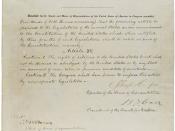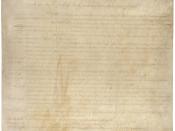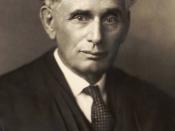Among the most quoted and reviewed amendments in the United States Constitution's Bill of Rights are the 1st and 2nd Amendments. Many Supreme Court cases have involved these amendments and it's obvious how relevant they are to our government and to our individual citizens, even after more than 200 years. These amendments practically define not only our Constitution, but us as a nation, and the freedoms offered therein.
The 1st amendment gives us freedoms of speech, religion, press, and the right of people to peaceably assemble and petition the government for a redress of grievances. This means that everyone in this country has the opportunity to speak their mind and air their views, whether political or otherwise. This does not apply if the words or actions present "a clear and present danger". That is, the dialogue or activity must not incite crime, breach of peace, sedition, or be obscene. By the 1st Amendment, people are also guaranteed the right to practice -or not- the religion of their choice.
In no way can the government restrict or impose religious beliefs on anyone.
Many people think reporters are protected from having to reveal their sources by the 1st amendment. This isn't always the case. In 2005, reporter Judith Miller was jailed for 85 days for refusing to disclose details of her conversation with Lewis 'Scooter' Libby, then Dick Cheney's Chief of Staff. She eventually was forced to testify in court. A United States District judge ruled Miller in contempt for refusing to provide evidence to a Grand Jury on who leaked the name of a CIA agent. In the U.S. naming a CIA official is a crime. She was stuck. This case shows the fragility of reporters' assumptions that they can protect the identities of their sources. Despite repeated efforts, Congress has...


